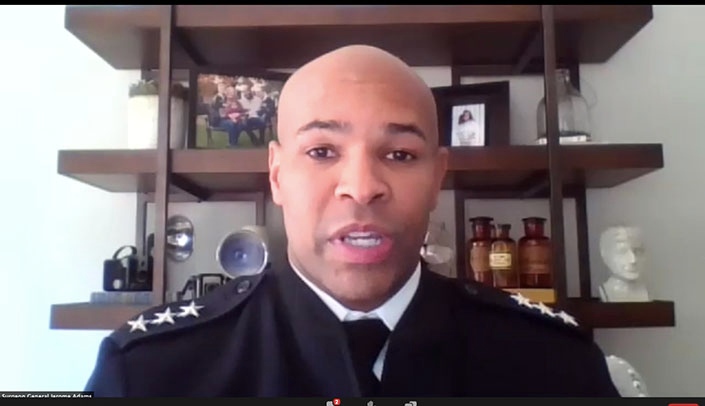More than 70 people attended the second “Health Policy in Action Conference,” which was held on Oct 3 via Zoom.
Guest speakers from across Nebraska and the nation, including Jerome Adams, MD, U.S. Surgeon General, vice admiral and anesthesiologist, engaged in discussions of health policy and the pandemic.
“We were honored to have the surgeon general be part of this year’s student-led event,” said Jed Hansen, a PhD candidate and family nurse practitioner student in the UNMC College of Nursing. “The conference underscored how important policy dialogue is among health professionals, whether it’s for a pandemic or for clinical care. Policy is incredibly important and frequently drives changes in care delivery and research funding which all translates into a healthier population.”
Hansen, one of the key organizers of the conference, is a student leader for the Primary Care Progress Chapter.
As keynote speaker, Dr. Adams focused his talk on the pandemic.
He shared messages of optimism — about a vaccine, partnerships that increase testing capability, the ability to slow the virus and how much has been learned about COVID-19.
Though COVID-19 infections are approaching more than 210,000, he said, “There’s “doom and gloom on TV. If we want people to have hope, we have to let them know that what they’re doing is working — that things are getting better.
“We’ve achieved and discovered more about this virus in eight months than any other time in history,” Dr. Adams said. “The fatality rate is going down significantly and there are fewer elderly taken away by this disease as well as allowing more people to leave hospital and leave it sooner.
“Arizona was among the worst infection rates. They now are in the green by simple health measures. It really can be done with washing your hands, watching your distance and wearing a mask,” he said.
He told health professionals in the virtual audience that their skills are needed now more than ever. “Your skills and experience, your dedication and stamina saves lives and ensures patients return to their families.”
He appealed to health professionals to talk to patients and others about getting a flu shot.
According to the Centers for Disease Control and Prevention, an estimated 35.5 million people got sick with influenza and 34,200 died during the 2018-2019 season.
“What happens if 35 million screen positive for flu?” Dr. Adams said. “It would wreak havoc on our ability to open up the economy. We can definitely avoid this if we encourage more people to get flu shots. It’s also one of the best ways to promote health equity.”
